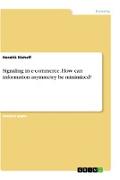- Start
- Signaling in e-commerce. How can information asymmetry be minimized?
Signaling in e-commerce. How can information asymmetry be minimized?
Angebote / Angebote:
Seminar paper from the year 2019 in the subject Business economics - Marketing, Corporate Communication, CRM, Market Research, Social Media, grade: 2, 3, University of Kaiserslautern, language: English, abstract: The main aspect of this seminar work is the question how the information economical problem of information asymmetry can be minimized in the e-commerce. With the example of Akerlofs lemons market it will be elaborated how a market failure can occur based on the asymmetric information distribution on a market. Even though there are several theories to explain the existence of buyer's uncertainty towards a seller, only the sig-naling theory will be further elaborated since the focus of this work is on possibilities to reduce the information deficit in the e-commerce. Furthermore, the signaling theory and the different types of signaling will be elaborated. The third chapter will be elaborating how various different signals can be used by an e-commerce seller to build up trust towards the buyer and also build up the satisfaction the buyer has after a transaction with the seller. The trust and likewise the satisfaction of the buyer are one of the crucial influences on the purchase and repurchase inten-tion the visitor of a website develops or not. This purchase intention is influenced by several variables as well. Overall the seller has to make sure that the signals he uses are generating enough interest for a future orientated performance promise and future orientated business relationships. The findings demonstrate possible ways for integrating the discussed signals into an efficient marketing mix.
Folgt in ca. 5 Arbeitstagen
